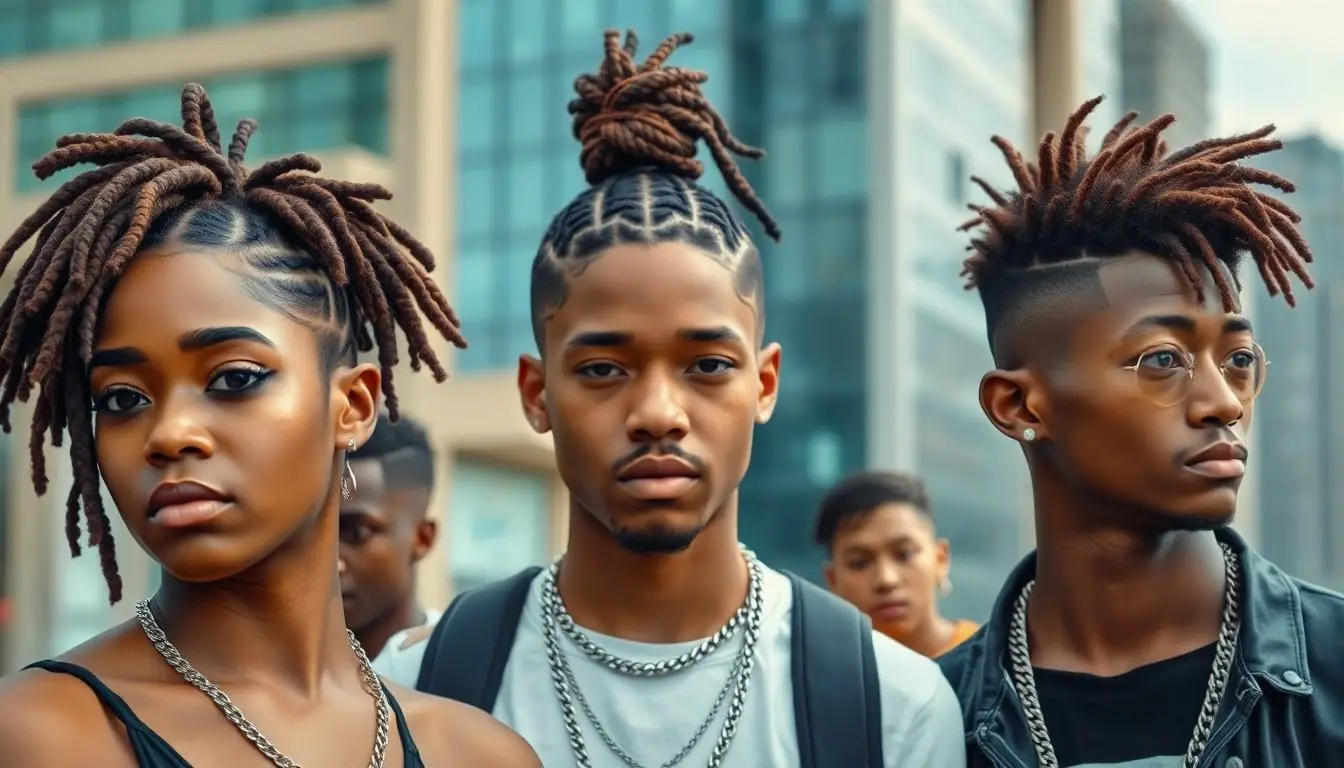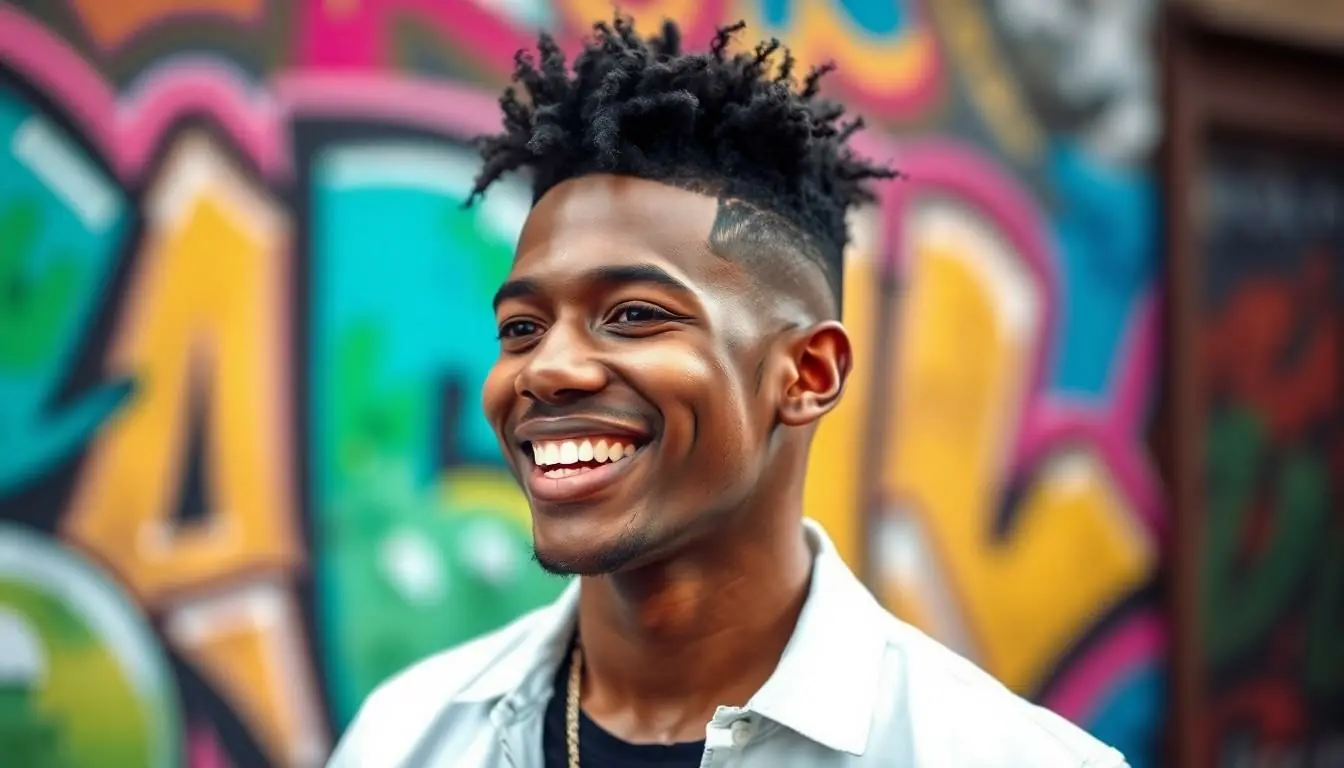Hip hop hairstyles are more than just a trend; they’re a bold statement. From gravity-defying afros to intricate braids, these styles tell stories of culture, creativity, and confidence. If you think hair is just hair, think again! It’s a canvas for self-expression, a way to stand out in a crowd, and sometimes, a way to distract from that questionable outfit choice.
Table of Contents
ToggleHistory of Hip Hop Hairstyles
Hip hop hairstyles reflect cultural evolution and creativity. These styles originate from various influences, highlighting the genre’s rich history.
Early Influences
African-American culture played a pivotal role in shaping hip hop hairstyles. The afro became a symbol of pride during the civil rights movement in the 1960s. Braids emerged as a connection to heritage, often showcasing intricate designs. Influences from street art, music, and fashion intertwined, creating a unique blend of self-expression. Icons like Afrika Bambaataa and Grandmaster Flash popularized these styles, elevating hair as a crucial aspect of their identity.
Iconic Styles Through the Decades
Throughout the decades, specific hairstyles defined various eras in hip hop. The 1980s saw high-top fades gaining popularity, particularly among artists like Kid ‘n Play. In the 1990s, cornrows became synonymous with artists like Tupac and Aaliyah, symbolizing strength and unity. The 2000s introduced dreadlocks, embraced by many artists for their connection to roots and culture. Each style encapsulated the values and aesthetics of its time, showcasing the ongoing evolution of hip hop culture.
Popular Hip Hop Hairstyles Today

Hip hop hairstyles reflect individuality and creativity in the culture. They showcase a range of styles that resonate with personal expression and heritage.
Braids and Cornrows
Braids and cornrows maintain a significant presence in hip hop culture. These styles can feature intricate patterns that represent various cultural backgrounds. Artists often incorporate bold colors and designs, making each style uniquely their own. Cornrows, in particular, gained popularity during the 1990s, symbolizing unity and strength within the community. Celebrities like Alicia Keys and Kendrick Lamar have popularized various braid styles, further influencing trends today.
Dreadlocks
Dreadlocks continue to symbolize identity and resistance within hip hop. Artists such as Bob Marley popularized dreadlocks, connecting them to cultural pride and authenticity. The maintenance of this style requires dedication, with many individuals viewing it as a spiritual journey. Influential figures like J. Cole and Lil Wayne have adopted dreadlocks, showcasing versatility in their looks. This hairstyle represents a connection to one’s roots while making bold fashion statements.
Buzz Cuts and Fades
Buzz cuts and fades offer a clean, edgy look, capturing attention effortlessly. These hairstyles emphasize simplicity while allowing for personal customization. Popular among many hip hop artists, buzz cuts symbolize confidence and straightforwardness. Fades can range from low to high, reflecting different styles. Notable figures such as 50 Cent and Drake have sported various fade styles, enhancing their overall image in the industry.
Celebrities Who Define Hip Hop Hairstyles
Hip hop hairstyles prominently reflect the culture’s essence and innovation. Many celebrities play crucial roles in defining these iconic looks.
Influential Artists
Rihanna showcases a dynamic range of hairstyles, often setting trends with her bold choices. Drake employs clean fades and occasional braids, influencing countless fans with his signature looks. Cardi B embraces vibrant colors and daring styles, illustrating the diversity within hip hop aesthetics. Lil Wayne’s dreadlocks symbolize a deep connection to heritage, inspiring others to express their identity through similar styles. J. Cole promotes the significance of natural hair, encouraging authenticity and individual expression among his followers.
Emerging Designers
Numerous emerging designers significantly shape hip hop hairstyles. BeautybyBlaire emphasizes intricate braid designs that celebrate cultural roots. Rocco’s Hair Studio brings modern twists to traditional styles, blending past influences with contemporary trends. Terrell Browne showcases versatile cutting techniques, attracting attention from fans and celebrities alike. Kamilah’s Creations specializes in vibrant color treatments that push creative boundaries within the genre. Innovators like these continuously redefine what hip hop hairstyles can represent, reinforcing cultural identity and artistic expression.
How to Achieve Popular Hip Hop Hairstyles
Achieving popular hip hop hairstyles involves creativity, the right techniques, and quality products. Many methods enhance styles that reflect personal identity and cultural significance.
Tips and Tricks
First, maintain clean, well-conditioned hair for manageable styling. Protective styles, like braids and twists, promote hair health while showcasing creativity. Next, consider using a wide-tooth comb to detangle without damage. Incorporate regular trims to maintain shape and prevent split ends. Experiment with accessories such as beads or clips for added flair. Understanding the art of layering products can help achieve desired hold without crunch. Lastly, watching tutorials from skilled stylists offers practical insights into mastering techniques.
Recommended Products
Choose quality products formulated for specific hair types. Hair oils, like argan or jojoba, nourish and add shine, enhancing the overall look. A strong hold gel or pomade will define styles without flaking. Incorporate leave-in conditioners for moisture that lasts. When working with braids or locs, use a lightweight mousse for flexibility. For finishing touches, opt for a setting spray to keep styles in place all day. Well-chosen products contribute significantly to the style’s longevity and appearance.
Hip hop hairstyles are more than just a way to look good; they embody a rich cultural narrative and personal identity. From the bold afros of the civil rights era to today’s intricate braids and edgy fades, these styles reflect the evolution of a vibrant community.
As artists continue to redefine trends, the connection between hair and self-expression remains strong. Embracing these hairstyles allows individuals to celebrate their heritage while showcasing their unique personalities. With the right techniques and products, anyone can achieve these iconic looks and join the ongoing conversation within hip hop culture.



